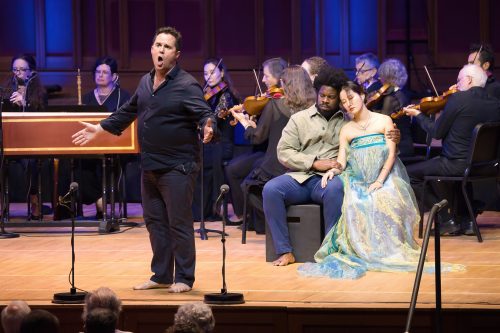 United States Tanglewood 2023 [2] – Handel, Acis and Galatea, a Masque: Soloists, Philharmonia Baroque Orchestra / Richard Egarr (conductor and harpsichord). Seiji Ozawa Hall, Tanglewood, Massachusetts, 20.7.2023. (CSa)
United States Tanglewood 2023 [2] – Handel, Acis and Galatea, a Masque: Soloists, Philharmonia Baroque Orchestra / Richard Egarr (conductor and harpsichord). Seiji Ozawa Hall, Tanglewood, Massachusetts, 20.7.2023. (CSa)

Cast:
Acis – Nicholas Mulroy
Galatea – Hera Hyesang Park
Polyphemus – Dashon Burton
Damon – Isaiah Bell
Ensemble – Daniel Moody
Stage Director – Aria Umezawa
The Berkshires in Western Massachusetts, home of the annual Tanglewood Music Festival, has been home to livestock farming for almost 350 years. Although shepherds and shepherdesses no longer roam its tree clad hills and rolling fields, they made a welcome return in Aria Umezawa’s semi-staged production of Acis and Galatea (sung in English). Drawn from Ovid’s Metamorphoses and based on a poem by John Gay, Handel’s pastoral opera, or masque, was one of Handel’s most popular works during the eighteenth century. Its tuneful arias, infectious rhythms, charming scoring and simplicity of plot combine to make a work of touching beauty.
Like this season’s production of Mozart’s Così fan tutte (review click here), the action takes place in Arcadian Sicily, an enchanted world where the water nymph Galatea and the shepherd Acis are rapturously in love. The threat to their bliss appears in the form of a monster, Polyphemus who loves Galatea and is intent on killing Acis, despite efforts by Mountain spirit Damon to restrain him.
Taking their places on the platform of the wood panelled Seiji Ozawa Hall, a small band of instrumentalists from the San Francisco-based Philharmonia Baroque Orchestra nestled around a harpsichord where their energetic music director Richard Egarr played and conducted. Their playing was brilliantly accomplished. Dressed in black and chiaroscuro-lit, the group, which included lutenist Kevin Payne plucking a four feet long theorbo, looked as if it had stepped out of a painting by Rembrandt or Vermeer. Compared to the stately 1960s Decca Adrian Boult/Joan Sutherland recording of the opera, Egarr drove the overture at almost breakneck speed, while the barefooted cast approached the stage from all corners of the auditorium. Particularly striking was Hera Hyesang Park as Galatea, ravishingly attired in a diaphanous gown of sea blue and pale green. Her crystalline soprano voice, controlled ornamentation and the clarity of her diction made such airs as ‘Hush ye pretty warbling quire’ (skilfully accompanied by Margaret Owens’s chirping recorder) and ‘As when the dove Laments her love’ achingly lovely. Nicholas Mulroy’s finely-toned tenor brought colour and credibility to the role of Acis as he searched for and serenaded Galatea among the verdant plains and woody mountains. Arias such as ‘Where shall I seek the charming fair’ and ‘Love in her eyes sits playing’ were sensuously and convincingly sung. Dashon Burton’s richly textured, grand bass-baritone and supple coloratura lends itself perfectly to the demands of Handel’s oratorios and operas. Notwithstanding his kindly face and obviously gentle disposition, he brought the appropriate degree of forest-shaking rage as the opera’s rogue Polyphemus. His impeccably enunciated ‘O Ruddier than the cherry’ brimmed with wicked humour. Isaiah Bell’s silvery tenor made for an elegant Damon with arias such as ‘Consider fond shepherd, how fleeting the pleasure’ stylishly executed, while countertenor Daniel Moody provided mellifluous support in the ensemble sections.

Semi-staged concert performances of opera can impose challenges on dramatic presentation, particularly where the music is rich and the plot slight. The strength of Umezawa’s spare but inventive production lay in its ingenuity and essential stillness. Props were minimal. The singers brought black wooden boxes on which to sit or occasionally stand. They formed silent but emotionally expressive tableaux when one of their number sang. After Polyphemus hurls a boulder (here a black box) at Acis, killing him, the lamenting Galatea uses her divine powers to immortalise her slain lover as a bubbling fountain. This transcendent moment was delicately suggested when an undulating swathe of blue and green fabric billowed across the stage. After a deeply touching chorus ‘Mourn all ye muses, weep all ye swains’, the singers united again to entreat Galatea to dry her tears. This proved to be good advice for the audience too, after experiencing such an affecting and intelligent entertainment.
Chris Sallon

I feel as if I was present at this performance! Thank you for your eloquent description of it.